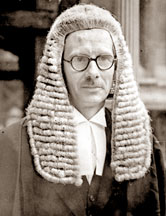|
Sir Ivor Jennings:
The multifaceted educationist
Sachitra Mahendra
The 42nd death anniversary of Sir Ivor Jennings, an author of Ceylon
constitution and the first Vice Chancellor of Peradeniya University,
falls today.
|

Sir Ivor Jennings |
History presents Ceylon under the British yoke as a somewhat gloomy
period. The same history, however, shows us the accounts of good-hearted
Englishmen who had a great respect towards Ceylon's culture; the likes
of John D'Oyly await an academic to go down into their souls.
I can be too young and naive to talk about Sir Ivor Jennings, whose
golden period in Ceylon existed long before I was born. I am, however,
sure that many generations to come in the future would find it essential
to study this man. When I read what is written on him, I see a simple
white man walking uphill in the vicinity of Kandy, one of Ceylon's older
Kingdoms.
When Ivor Jennings was born in Bristol on May 16, 1903, William and
Eleanor would not have pictured their son's glistening academic and
administrative career in a far away land. Jennings set off his academic
journey at the Leeds University in 1925.
The budding lecturer - yet to achieve the much covetous Knighthood
and Doctorate - then joined the London School of Economics and Political
Science as a lecturer in law.
A glistening career waited for him, when Jennings accepted his charge
in Ceylon for the first time in 1940 as the Principal of Ceylon
University College, which later on turned out to be Peradeniya
University making its Principal the Vice Chancellor in 1942.
The Vice Chancellor combined the University College and the Medical
College into one body, following the shifting of campus grounds into
Peradeniya.
The middle period of the Vice Chancellor's tenure witnessed the
glamour of the University with the Faculties of Arts, Oriental Studies,
Agriculture and Veterinary Science, the Departments of Dental surgery,
and the well-equipped Health Centre.
The Vice Chancellor was Knighted in 1948 and subsequently the
Doctorate was conferred in recognition for his administrative service to
the Peradeniya University. The Doctorate, very much unlike today, was
meant for the really deserved.
Writing was something insatiable with Sir Ivor Jennings. Being a
prolific writer, he is said to have written almost everything at a given
time.
It is no surprise, then, to see the serious publications authored by
him: The Constitution of Ceylon, The Economy of Ceylon, The Commonwealth
in Asia, Some Characteristics of the Indian Constitution, Ceylon and its
People, The Queen's Government and the Dominion of Ceylon.
Sir Ivor Jennings, nevertheless, was not privileged to exist without
criticism. He was obviously scoffed at for his restricted vision of
creating a single University confined to issuing internal degrees in
English.
The national language medium was to be imposed on internal degrees
following his resignation in 1955. Sir Jenning's contribution to Ceylon
constitution is also an interesting study. By this time, Ceylon was in
transition - it was to gain independence from Britain, but the ruling
was yet to be shared between the colony and the empire - Dominion
status.
In his Constitution of Ceylon, Jennings explains the inside story of
how Ceylon became a Dominion status. "The process of development of the
Ceylon Constitution of 1946 - 47 began on May 26, 1943, when, at the
request of the Board of Ministers under the Donoughmore Constitution of
1931, the Government of the United Kingdom issued a Declaration of
Policy on Constitutional Reform in Ceylon.
The same evening D S Senanayake [then Prime Minister], Sir Oliver
Goonetillake [then High Commissioner for Ceylon] and I had a discussion
on the steps necessary to secure Dominion status. At the end of it I
found myself virtually enroled as honorary constitutional adviser, and,
though many others were called in to assist, I continued to fill that
role until Independence was obtained on February 4, 1948."
(The above quoted section was extracted from 'Revolt in the Temple')
Ceylon was ruled under a British Head of State until it gave up its
'Ceylon' title and became Democratic Socialist Republic of Sri Lanka in
1972 under a new Constitution.
It is ironic to see him dishonoured at the very University he
nurtured lovingly; this stems from the mounting criticism levelled
against him especially for being a British.
Whatever things there can be, one thing is definite - the buildings
of Sri Lanka's one of the oldest universities still carry the spirit of
a man who shouldered one-time academic uplift in a country that was not
his own.
|

